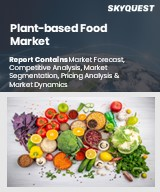
|
시장보고서
상품코드
1655636
미국의 식물성 식품 시장 평가 : 제품 유형별, 공급원별, 최종 용도별, 유통 채널별, 지역별, 기회 및 예측(2018-2032년)United States Plant-Based Food Market Assessment, By Product Type, By Source, By End-Use, By Application, By Distribution Channel, By Region, Opportunities, and Forecast, 2018-2032F |
||||||
미국의 식물성 식품 시장은 2025-2032년의 예측 기간 동안 12.53%의 연평균 복합 성장률(CAGR)을 나타내고, 2024년 128억 4,000만 달러에서 2032년 331억 1,000만 달러로 성장할 것으로 예상됩니다. 이 시장은 최근 몇 년동안 큰 성장세를 보이고 있으며, 그 요인으로는 식물성 식단의 건강 및 환경적 이점에 대한 인식 증가, 소비자 선호도 변화, 식품 기술 발전 등을 꼽을 수 있습니다.
미국의 식물성 식품 시장은 건강하고 지속 가능한 식품에 대한 수요가 증가함에 따라 식품 산업에서 빠르게 성장하고 있는 분야입니다. 식물성 식품은 채소, 과일, 곡물, 콩류, 견과류 등 식물에서 추출한 원료로 만들어집니다. 이러한 제품은 일반적으로 육류, 유제품, 계란 등 동물성 식품을 사용하지 않기 때문에 비건, 채식주의자, 플렉시테리언(채식주의자)에게 매력적인 선택이 될 수 있습니다. 이 카운티 인구의 약 8%가 채식주의자이며, 3%가 비건 채식주의자입니다. 식물성 식품 시장에는 대체 육류, 대체 유제품, 식물성 스낵, 식물성 음료 등 다양한 제품이 포함됩니다. 식물성 식품에 대한 수요가 증가함에 따라 시장은 계속 확대되고 진화하여 식품 산업에 혁신과 성장의 기회를 제공할 것으로 보입니다.
아마씨, 퀴노아, 완두콩 단백질, 치아, 귀리 등 식물성 단백질 원료가 널리 보급되면서 식품에 영양을 더하고 우유, 육류, 계란을 대체할 수 있는 건강한 대안으로 떠오르고 있습니다. 식물성 식단이 일반 식단보다 비싸다는 소비자의 오해와 특히 저소득층 미국인들이 식물성 식품과 신선한 식재료를 구입하기 어렵다는 인식이 시장 성장을 제한적으로 방해하고 있습니다. 2024년 3월, 이스라엘의 식품 기술 기업 Yo Egg는 로스엔젤레스를 중심으로 한 미국 소매점에서 식물성 식단을 쉽게 제공할 수 있는 혁신적인 솔루션을 제공함으로써 이 시장의 잠재력을 끌어낼 수 있습니다. 미국 로스엔젤레스를 중심으로 한 미국 소매점에서 비건 수란과 써니사이드업(Sunny Side Up)을 판매하기 시작했으며, 요에그는 이미 조리된 냉동 수란과 써니사이드업(Sunny Side Up) 계란을 전문으로 하며, 볶거나 끓일 수 있습니다. 제품은 주로 콩 단백질, 병아리콩, 해바라기 기름으로 구성되어 있습니다.
목차
제1장 프로젝트의 범위와 정의
제2장 조사 방법
제3장 주요 요약
제4장 고객 소리
- 응답자 인구통계
- 현재 소비 선호
- 식물성 식품 섭취 빈도
- 식물성 식품을 선택하는 주요 동기
- 식물성 식품 도입 과제
- 마음에 드는 식물 유래 제품
- 향후 6개월간 식물성 식품 소비가 증가할 가능성
- 식물성 식품 브랜드 브랜드 인지도
- 정보원
- 식물성 식품 카테고리 혁신
- 우선 유통 채널
제5장 미국의 식물성 식품 시장 전망, 2018년-2032년
- 시장 규모 분석과 예측
- 금액별
- 수량별
- 시장 점유율 분석과 예측
- 제품 유형별
- 유제품
- 고기/어개류/계란
- 밀(Meal)
- 기타
- 소스별
- 견과류 및 종자
- 채소(콩류 포함)
- 곡물
- 과일
- 기타
- 최종 용도별
- 주택
- 상업
- 용도별
- 식품
- 식이보충제
- 음료
- 동물 영양
- 기타
- 유통 채널별
- 오프라인
- 온라인
- 지역별
- 서부
- 남부
- 북동부
- 중서부
- 기업별 시장 점유율 분석(주요 5개사, 기타 - 금액별, 2024년)
- 제품 유형별
- 시장 맵 분석, 2024년
- 제품 유형별
- 소스별
- 최종 용도별
- 용도별
- 유통 채널별
- 지역별
제6장 수요 및 공급 분석
제7장 수출입 분석
제8장 밸류체인 분석
제9장 PESTLE 분석
제10장 Porter의 Five Forces 분석
제11장 시장 역학
- 시장 성장 촉진요인
- 시장이 해결해야 할 과제
제12장 가격 분석
제13장 사례 연구
제14장 경쟁 구도
- 주요 5개 시장 리더의 경쟁 매트릭스, 2024년
- SWOT 분석(주요 6개 기업용)
- 주요 11개 기업의 기업 상황
- Conagra Brands Inc.
- 기업 개요
- 주요 경영진
- 주요 제공 제품
- 주요 시장에의 주력과 지역 존재감
- 최근 동향
- Impossible Foods Inc.
- MorningStar Farms
- Beyond Meat, Inc.
- The Hain Celestial Group, Inc.
- Amy's Kitchen, Inc.
- Hormel Foods Corporation
- Boca Burger Inc.
- Puris Holding LLC
- LightLife Food Inc.
- Atlantic Natural Foods LLC
- Conagra Brands Inc.
제15장 전략적 제안
제16장 리서치사에 대해 & 면책사항
LSH 25.03.06United States plant-based food market is projected to witness a CAGR of 12.53% during the forecast period 2025-2032, growing from USD 12.84 billion in 2024 to USD 33.11 billion in 2032. The market has experienced significant growth in recent years, fueled by factors such as increasing awareness of the health and environmental benefits of plant-based diets, changing consumer preferences, and advancements in food technology.
The United States plant-based food market is a rapidly growing segment of the food industry, driven by a rising demand for healthier and more sustainable food options. Plant-based food products are made from ingredients that are derived from plants, such as vegetables, fruits, grains, legumes, and nuts. These products are typically free from animal products such as meat, dairy, and eggs, making them an appealing choice for consumers looking for vegan, vegetarian, or flexitarian options. Nearly 8 percent of the county's population is vegetarian, and 3 percent is vegan. The plant-based food market includes a wide range of products such as meat alternatives, dairy alternatives, plant-based snacks, and plant-based beverages. As the demand for plant-based food products continues to rise, the market will likely continue to expand and evolve, presenting opportunities for innovation and growth in the food industry.
The wider availability of plant protein ingredients such as flaxseed, quinoa, pea proteins, chia, and oats are adding nutritional flavors to food, making them a healthier alternative to milk, meat, and eggs. Consumer's misconception of plant-based meals being more expensive than the regular meal options and accessibility to buy plant-based food and fresh produce, especially for the lower-income Americans, hinders the market growth to a limited extent. Although, new entrants as well as existing players can tap this market potential by bringing innovative solutions to provide easy accessibility of plant-based meals to this mass group. In March 2024, Yo Egg, an Israeli food technology firm, began selling its vegan poached eggs and sunny-side-ups at US retail locations, with the primary focus on Los Angeles. Yo Egg specializes in precooked frozen poached and sunny-side-up eggs that are ready to fry or boil. The products are composed primarily of soy protein, chickpeas, and sunflower oil.
Increasing Consumer Preference for Healthier Diets Catalyses Market Expansion
The availability of plant-based food products has increased significantly in recent years in the United States, driven by growing consumer demand for healthier and more sustainable food options. Supermarkets and restaurants across the country have responded to this demand by increasing their offerings of plant-based products, including plant-based meat alternatives, dairy-free milk, and vegan cheese. Plant-based alternatives offer various health benefits such as controlled blood sugar, and lowered cholesterol level. Moreover, large food companies have started to introduce plant-based alternatives to traditional meat and dairy products, further expanding the availability of plant-based options. For instance, in February 2024, Califia Farms launched a plant-based milk, Califia Farms Complete, which contains nutrients, protein, amino acid and lesser sugar as compared to dairy-based milk. The product is made using a mixture of chickpea, pea, and fava bean protein.
As the availability of plant-based products continues to increase, it is likely that the plant-based food market will continue to grow in the United States. The US retail sales for plant-based foods were USD 8 billion in 2023 out of which the plant-based milk category accounted for USD 2.8 billion with more than 40 percent of the household penetration.
Environmental Sustainability and Ethical Considerations Fuel the Market Demand
Environmental sustainability and ethical considerations are significant market drivers for plant-based foods in the United States. Consumers are becoming more aware of how their food choices impact the environment, thereby enhancing the demand for sustainable options. Generally, when compared to animal products, plant products have a lower carbon footprint, which attracts environmentally conscious consumers. Furthermore, many consumers seeking plant-based alternatives that do not involve animal suffering are motivated by animal welfare concerns. This trend is seen mostly in the younger generations, like Gen Z and Millennials, who base their purchasing decisions on sustainability and ethical consumption. Consequently, companies are expanding their plant-based product lines to meet this demand and fuel the market's growth.
Aligning with the trend, in March 2024, the first plant-based Oscar Mayer offerings and the first plant-based meat invention from the joint venture between The Kraft Heinz Company and TheNotCompany, Inc., were introduced by The Kraft Heinz Not Company LLC as NotHotDogs and NotSausages. Both products provide a smoky and savory taste experience for the consumers, with juicy and thick bites satisfying their cravings.
Plant-based Dairy Segment Holds the Majority of the Market Share
The United States plant-based food market is closely linked to the growing popularity of plant-based diets, which have become increasingly popular in recent years due to their numerous health benefits and environmental advantages. Dairy alternatives hold a prominent share in the plant-based food market in the United States mainly owing to a large lactose intolerant population. Nearly 36% of the country's population is lactose intolerant. Plant-based milk captures 15% of the total milk market in the United States.
Other reasons for the adoption of dairy alternatives include a shift towards vegan lifestyles and concerns for the environment. Innovation focusing on texture and taste has aided in propagating consumer acceptance for fortified and functional dairy alternatives. With the expansion of retail and food service assistance comes market growth. Dairy substitutes have proven to grow at a much faster pace compared to other categories, with consumers gradually switching to plant-based diets, which further adds strength to this leading category of plant-based foods in the country. In November 2024, The Laughing Cow, under Bel Brands USA, Inc., introduced its plant-based spreadable cheese to nationwide customers. The product is targeted at customers in search of spreadable alternatives based on plants and is made using almond milk for a creamy mouthfeel.
Future Market Scenario (2025 - 2032F)
Scaled up plant-based meal varieties with innovations in flavors, texture, and nutritional value are expected to stimulate the interests of mainstream consumers.
Major players from both established and start-up companies will likely increase investment in plant-based food offerings contributing to the growth of the market.
Further growth will be seen in the market due to the increasing consumer awareness and demand for sustainable, ethical, and health-conscious food choices.
Key Players Landscape and Outlook
The market for plant-based foods in the United States is fragmented, with a number of small- and medium-sized businesses as well as recent entrants. Prominent players include Amy's Kitchen, Inc., Beyond Meat, INC., Impossible Food, Inc., Boca Foods Company (Kraft Foods, Inc.), Hormel foods Corporation, Morning Star Farms (Kellogg Na Co.), and The Hain Celestial Group, Inc. among others. To increase their product offerings and worldwide footprints, these players put numerous tactics into practice. New product releases, collaborations, agreements, partnerships, and acquisitions are the primary business tactics used by the majority of enterprises in the market for plant-based foods. In March 2025, Beyond Meat, Inc. announced the launch of a redesigned and extended range of Beyond Crumbles in the United States, available in three delicious flavours with low saturated fat content, and satisfying the nutritional requirements of both the Better Choices for Life and Heart-Check Food Certification Programmes from the American Diabetes Association and the American Heart Association, respectively.
Table of Contents
1. Project Scope and Definitions
2. Research Methodology
3. Executive Summary
4. Voice of Customers
- 4.1 Respondent Demographics
- 4.2 Current Consumption Preference
- 4.3 Frequency of Plant-Based Consumption
- 4.4 Primary Motivations for Choosing Plant-Based Foods
- 4.5 Challenges Faced in Adopting Plant-Based Foods
- 4.6 Favorite Plant-Based Products
- 4.7 Likelihood of Increasing Plant-Based Food Consumption in the Next 6 Months
- 4.8 Brand Awareness of Plant-Based Food Brands
- 4.9 Sources of Information
- 4.10 Innovation in Plant-Based Food Categories
- 4.11 Preferred Distribution Channel
5. United States Plant-Based Food Market Outlook, 2018-2032F
- 5.1 Market Size Analysis & Forecast
- 5.1.1 By Value
- 5.1.2 By Volume
- 5.2 Market Share Analysis & Forecast
- 5.2.1 By Product Type
- 5.2.1.1 Dairy
- 5.2.1.2 Meat, Seafood & Eggs
- 5.2.1.3 Meals
- 5.2.1.4 Others
- 5.2.2 By Source
- 5.2.2.1 Nuts & Seeds
- 5.2.2.2 Vegetables (Including Legumes)
- 5.2.2.3 Grains
- 5.2.2.4 Fruits
- 5.2.2.5 Others
- 5.2.3 By End-Use
- 5.2.3.1 Residential
- 5.2.3.2 Commercial
- 5.2.4 By Application
- 5.2.4.1 Food
- 5.2.4.1.1 Confectionery
- 5.2.4.1.2 Bakery
- 5.2.4.1.3 Infant Food
- 5.2.4.1.4 Others
- 5.2.4.2 Dietary Supplements
- 5.2.4.3 Beverages
- 5.2.4.4 Animal Nutrition
- 5.2.4.5 Others
- 5.2.4.1 Food
- 5.2.5 By Distribution Channel
- 5.2.5.1 Offline
- 5.2.5.1.1 Supermarkets/Hypermarkets
- 5.2.5.1.2 Department & Convenience Stores
- 5.2.5.1.3 Brand Stores/Kiosks
- 5.2.5.1.4 Others
- 5.2.5.2 Online
- 5.2.5.1 Offline
- 5.2.6 By Region
- 5.2.6.1 West
- 5.2.6.2 South
- 5.2.6.3 Northeast
- 5.2.6.4 Midwest
- 5.2.7 By Company Market Share Analysis (Top 5 Companies, Others - By Value, 2024)
- 5.2.1 By Product Type
- 5.3 Market Map Analysis, 2024
- 5.3.1 By Product Type
- 5.3.2 By Source
- 5.3.3 By End-Use
- 5.3.4 By Application
- 5.3.5 By Distribution Channel
- 5.3.6 By Region
6. Demand and Supply Analysis
7. Import and Export Analysis
8. Value Chain Analysis
9. PESTLE Analysis
10. Porter's Five Forces Analysis
11. Market Dynamics
- 11.1 Market Drivers
- 11.2 Market Challenges
12. Pricing Analysis
13. Case Studies
14. Competitive Landscape
- 14.1 Competition Matrix of Top Five Market Leaders, 2024
- 14.2 SWOT Analysis (For Top Six Players)
- 14.3 Key Players Landscape for Top 11 Market Players
- 14.3.1 Conagra Brands Inc.
- 14.3.1.1 Company Details
- 14.3.1.2 Key Management Personnel
- 14.3.1.3 Key Products Offered
- 14.3.1.4 Key Market Focus & Geographical Presence
- 14.3.1.5 Recent Developments
- 14.3.2 Impossible Foods Inc.
- 14.3.3 MorningStar Farms
- 14.3.4 Beyond Meat, Inc.
- 14.3.5 The Hain Celestial Group, Inc.
- 14.3.6 Amy's Kitchen, Inc.
- 14.3.7 Hormel Foods Corporation
- 14.3.8 Boca Burger Inc.
- 14.3.9 Puris Holding LLC
- 14.3.10 LightLife Food Inc.
- 14.3.11 Atlantic Natural Foods LLC
- 14.3.1 Conagra Brands Inc.















